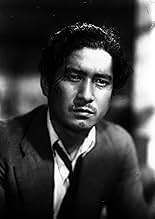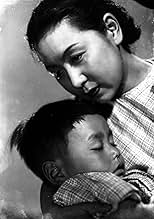NOTE IMDb
7,4/10
2,1 k
MA NOTE
Tokiko vit seule avec son jeune fils Hiroshi en attendant que son mari soit démobilisé. . Hiroshi tombe malade, et Tokiko n'a pas d'autre choix que de se prostituer un soir pour pouvoir paye... Tout lireTokiko vit seule avec son jeune fils Hiroshi en attendant que son mari soit démobilisé. . Hiroshi tombe malade, et Tokiko n'a pas d'autre choix que de se prostituer un soir pour pouvoir payer le traitement.Tokiko vit seule avec son jeune fils Hiroshi en attendant que son mari soit démobilisé. . Hiroshi tombe malade, et Tokiko n'a pas d'autre choix que de se prostituer un soir pour pouvoir payer le traitement.
- Réalisation
- Scénario
- Casting principal
- Récompenses
- 2 victoires et 1 nomination au total
Avis à la une
10kerpan
Ozu's late film are far more varied than "common wisdom" would have it -- but, by any measure, "Hen in the Wind" (from 1948) is especially "atypical". This is the only Ozu film I've seen (out of 21 or 20) that has a tangible (and even raw) physicality -- it is more like proto-Imamura than "standard" Ozu (no -- Imamura was not yet working as Ozu's assistant -- that only began around 1951). Characters crawl, slither, and slide about. Sometimes, visually oversized bare feet stick into the foreground. Kinuyo Tanaka loses all self possession at the climax, and practically keens her dialog -- at a much higher pitch than I've ever heard her use in any other film.
This is an interesting story that deals with the collateral damage caused by WW2 (and the ensuing occupation) -- as it affected the lives of one young married couple. It was a flop with the audience, I guess -- so it became a path not traveled further. Artistically, it may not be completely successful, but it was a worthy effort.
This is an interesting story that deals with the collateral damage caused by WW2 (and the ensuing occupation) -- as it affected the lives of one young married couple. It was a flop with the audience, I guess -- so it became a path not traveled further. Artistically, it may not be completely successful, but it was a worthy effort.
Ozu's first movie after the war is full of scenery that points towards a rapidly industrializing Japan. There are no remnants of what happened a handful of years ago. As a son of a single parent, I empathized with the film's protagonist. Yes, Ozu does make his character do the extreme because that makes for a far more engaging cinema.
A Hen in the Wind also manages to depict a real look at marriages and how much woes Japanese (and Southeast Asian) women were subject to. At that time, both capitalist and communist nations put out propaganda films to show their women as leaders. A Hen in the Wind.gives you an authentic peek at how much genuflecting women from these cultures had to perform in order to live a very ordinary life where poverty awaits them at every corner. The Italian film, Bicycle Thieves (released around the same time) makes a great companion piece to A Hen in the Wind. If you've loved one, you'll love the other.
A Hen in the Wind also manages to depict a real look at marriages and how much woes Japanese (and Southeast Asian) women were subject to. At that time, both capitalist and communist nations put out propaganda films to show their women as leaders. A Hen in the Wind.gives you an authentic peek at how much genuflecting women from these cultures had to perform in order to live a very ordinary life where poverty awaits them at every corner. The Italian film, Bicycle Thieves (released around the same time) makes a great companion piece to A Hen in the Wind. If you've loved one, you'll love the other.
Kaze no Naka no Mendori deals with a very serious social problem of the time -- the return of those away at war. Frequently supposed dead and often delayed by years after the war's end, returning soldiers came back to families that had had to make all manner of compromises and sacrifices related to their absence. Often the returnees found that their wives had re-married, or worse...
This is one such story. Unusual for Ozu in that it depicts actual physical family violence. A bit shocking if you are used to his other films, in which disapproval is often expressed with raised eyebrows and silence.
A good film with fine performances.
This is one such story. Unusual for Ozu in that it depicts actual physical family violence. A bit shocking if you are used to his other films, in which disapproval is often expressed with raised eyebrows and silence.
A good film with fine performances.
"Record of a Tenement Gentleman" is Ozu's actual first post-war movie, but while it is set in a post-war environment it still relied a lot in his themes of family, father/mother and son, family love that Ozu had always explored, rather than discussing questions from a post-war society.
"A Hen in the Wind" does that. It offers a true war/post-war situation and deals with the people that suffer from it.
The story is quite simple and I've found some of his other movies to be more emotional. However, it is one of his most serious and violent. I do think Ozu is capable of adding more depth to his movies than what we see here, but I was very happy to find a different subject from what he does usually, explored in a such disturbing way. Ozu's themes are pretty much the same all over his work, but "A Hen in the Wind" stands out for a different kind of serious issue. It is, for that, very refreshing.
Very serious, very sad, very human, unexpectedly violent and a touching look at a post-war situation, it stands out mostly for being different from Ozu's usual themes.
"A Hen in the Wind" does that. It offers a true war/post-war situation and deals with the people that suffer from it.
The story is quite simple and I've found some of his other movies to be more emotional. However, it is one of his most serious and violent. I do think Ozu is capable of adding more depth to his movies than what we see here, but I was very happy to find a different subject from what he does usually, explored in a such disturbing way. Ozu's themes are pretty much the same all over his work, but "A Hen in the Wind" stands out for a different kind of serious issue. It is, for that, very refreshing.
Very serious, very sad, very human, unexpectedly violent and a touching look at a post-war situation, it stands out mostly for being different from Ozu's usual themes.
A sensitive and powerful examination of the moral compromises made during World War II and the toll they take on families. Kinuyo Tanaka gives another of her sensitive and compelling performances as a woman forced into prostitution to care for her sick child, and is unable to keep her secret when her husband returns from the front. Ozu takes on the topic of prostitution while steering well clear of its potential for sordidness (something I find both a virtue and a limitation... in some ways it's *too* tactful). The scenes between the two exceptional leads contribute to a film blessed with some of the most uncomortable scenes Ozu has filmed, delving deep into raw unresolved emotions of guilt, honor and devotion.
Le saviez-vous
- AnecdotesFrench visa # 159347.
- Citations
Tokiko Amamiya: I'm willing to give mu soul if it means raising my son.
- ConnexionsReferenced in J'ai vécu, mais... (1983)
- Bandes originalesYume awaki Tôkyô
Music by Yûji Koseki
Meilleurs choix
Connectez-vous pour évaluer et suivre la liste de favoris afin de recevoir des recommandations personnalisées
- How long is A Hen in the Wind?Alimenté par Alexa
Détails
- Date de sortie
- Pays d’origine
- Langue
- Aussi connu sous le nom de
- Une poule dans le vent
- Société de production
- Voir plus de crédits d'entreprise sur IMDbPro
- Durée
- 1h 24min(84 min)
- Couleur
- Mixage
- Rapport de forme
- 1.37 : 1
Contribuer à cette page
Suggérer une modification ou ajouter du contenu manquant

























